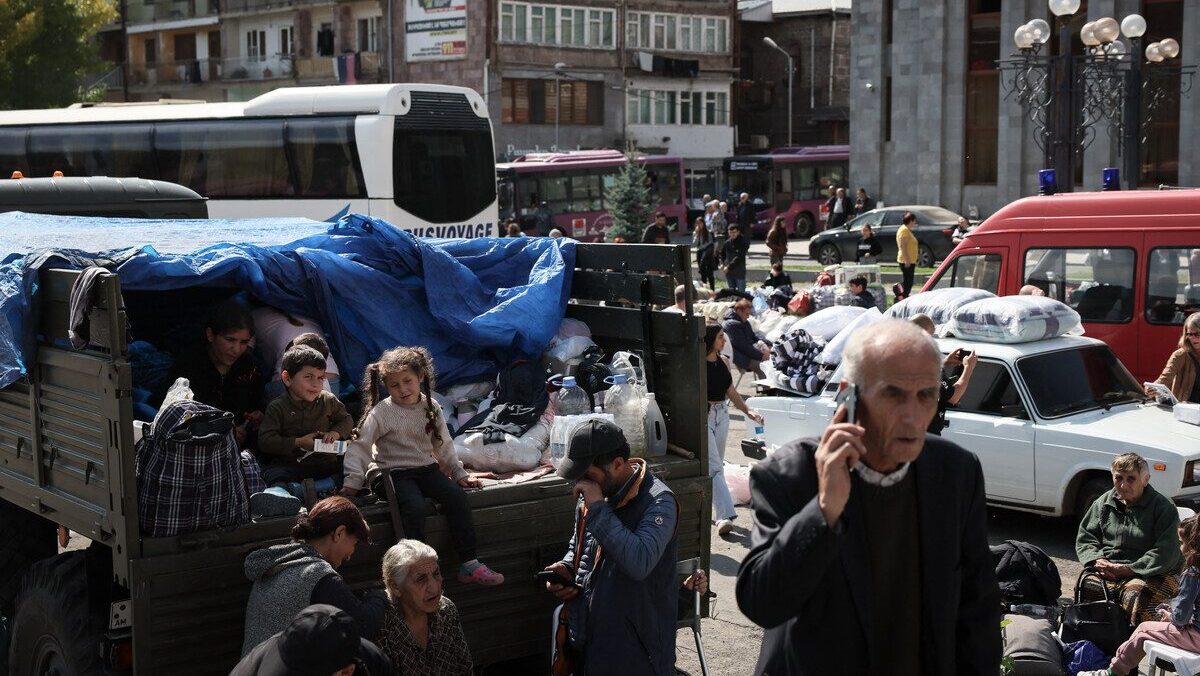
Armenian refugees wait in a square of Goris city centre on September 29th, 2023 before being evacuated in various Armenian cities, as the exodus from the Nagorno-Karabakh ethnic Armenian enclave continues.
ALAIN JOCARD / AFP
Barely one day after their government’s decision to dissolve the Republic of Artsakh in the face of the Azerbaijani onslaught, over three-quarters of the population of Nagorno-Karabakh have fled, international media report.
The ethnic Armenian—and majority Christian—breakaway region has a population of 120,000.
On the exodus’ fifth day, September 29th, Armenia’s government said nearly 93,000 people had already crossed into its territory.
Armenia, which proved unable to shield the enclave from Azerbaijan’s lightning military offensive, sent city buses from its capital of Yerevan to facilitate the evacuations.
Baku—the Azerbaijani capital—has said it would respect the rights of ethnic Armenians who do choose to stay and would allow a UN team to visit the region within days.
The UN refugee agency, UNHCR, is already on the ground providing support with “core relief items,” said representative Kavita Belani.
“People are tired. This is a situation where they’ve lived under nine months of blockade. When they come in, they’re full of anxiety, they’re scared, they’re frightened and they want answers as to what’s going to happen next,” Belani added, noting that psychosocial support, medication, and shelter for everybody are top priorities.
Agencies, she said, were preparing to cope with 120,000 people, 30,000 more than earlier anticipated.
Nearly a third of the refugees are children, including many separated from their families.
🇺🇳UNHCR in #Goris, supporting #refugees at the state established registration centre. #UNHCR is grateful to the Government of 🇦🇲Armenia, host communities & volunteers who work 24/7, helping #refugees in need of shelter, food & basic items, thankful to all for empathy and care.🙏 pic.twitter.com/9pe02r86OX
— UNHCR Armenia (@UNHCRArmenia) September 28, 2023
“The situation often involves families arriving with children so weak that they have fainted in their parents’ arms,” said International Federation of Red Cross and Red Crescent Societies representative Hicham Diab.
Carlos Morazzani, operations manager of the International Committee of the Red Cross, said it had transferred around 200 bodies out of Karabakh, victims of a huge blast at a fuel depot on the night the exodus started, as well as of recent fighting.
The Red Cross will be focusing on helping those left behind, with basic food and hygiene items, he said.
“We had been planning for the evacuation to be a longer process,” Morazzani said. “The evacuations this week have gone very fast, very high numbers of people, but as a result of that many people have become stranded.”
Western countries have denounced Azerbaijan’s aggression on Karabakh while calling on Baku to fulfill its promise it would guarantee all civilians’ safety. A European Union spokesman said in a statement,
Azerbaijan bears the responsibility to ensure the rights and security of the Karabakh Armenians, including their right to live in their homes in dignity without intimidation and discrimination, as well as the right to return for those displaced.
In the 1990s, following the Soviet Union’s implosion, the Azerbaijani population was itself expelled from Nagorno-Karabakh by Karabakh separatists. Hundreds of thousands of people were displaced within Azerbaijan itself.
A short war in 2020 brought much of that land back under Azerbaijani control, but the separatists managed to retain Karabakh itself under a peace agreement brokered by Moscow and guaranteed by Russian peacekeepers.
Armenia has blamed Russia for failing to ensure the security of the breakaway region, which Moscow refuses to accept.
Following the 2020 war, the government in Baku relocated Azerbaijanis to territories recaptured from Nagorno-Karabakh forces—something, given the fact most ethnic Armenians appear to have chosen permanent exile, it is likely to do once more.
